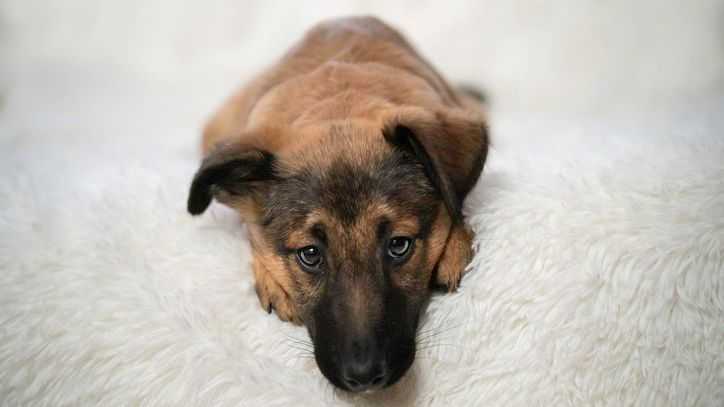What to do if your puppy looks sick
Looking after your puppy is a big responsibility that can feel overwhelming, especially if you’re a first-time pet owner. Puppies use lots of energy when playing. Therefore, this can make it challenging to know if your puppy is tired or if there’s something more serious going on.
Puppies are more susceptible to health issues than adult dogs, as their immune system is still developing. This is why it’s essential to keep on top of your puppy’s vaccination schedule. It will help to prevent infections and sometimes even deadly diseases.
When becoming a pet owner, it is crucial to remain vigilant and know how to spot the symptoms of a sick puppy. This way, you can react swiftly and take the best course of action.

Common signs your puppy is sick
There are various signs and symptoms to look out for when determining whether your puppy is sick. The most common include:
- Bad breath
- Excessive drooling
- Eyes (dry, itchy, red)
- Excessive licking or scratching
- Dry skin or lesions
- Fatigue
- Diarrhea
- Vomiting
- Joint stiffness
- Change in appetite
- Unjustified increase in thirst

How to tell if your puppy is sick, tired or upset
Those first few weeks with your puppy are precious as you get to know each other. The more observant you are, the easier it is to see if something is off.
If you suspect that your puppy is more than just tired, check for the following signs:
- Has there been a change in their routine/environment?
- Has their temperature changed?
- Have they had a loss of appetite?
- Are they experiencing dehydration?
When determining if your puppy is ill, trust your gut—you know if your puppy isn't acting right. Therefore, if you have any concerns, contact your vet. It is always better to get help from a professional than to take no action.
Most common illnesses in puppies
During their first few months of development, there are common illnesses that your puppy will face. These include:
There are several signs of puppy dehydration to watch out for:
- sticky or dry gums
- sticky saliva
- loss of skin elasticity
Puppy skin problems can occur often due to their day-to-day antics. It’s important to check their coat and skin daily for scratches, ticks, or insect bites. Contact a professional if you find something unusual or if their coat loses its shine.
If you suspect your puppy has any of these illnesses, get in touch with your vet for further guidance.

Looking after your sick puppy
It is important to be patient if your puppy starts showing signs of being ill. They will pick up on any stress you are feeling, which will only add to their anxiety. Your role is to keep them comfortable and encourage them to rest. Make sure they have access to fresh water and make a note of their symptoms, as well as any changes in their behavior. The quicker you act, the better.
You may have noticed that we always advise calling your vet if you have the slightest doubt about your puppy’s health. That’s because the relationship you and your puppy have with your vet is significant. The more information you can provide them, the faster they’ll know how to act on the situation.
Related Articles

Why does my puppy have diarrhea?
